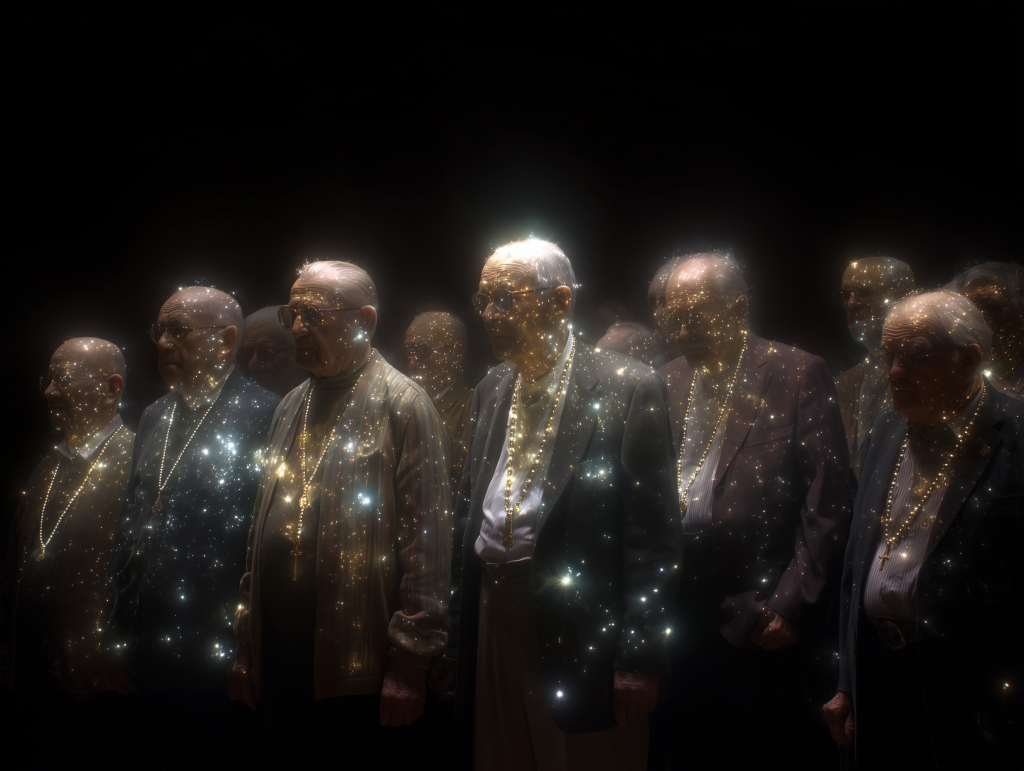I approach AI not as a tool but as a partner in dramaturgy; a co-actor in the unfolding of attention, perception, and meaning. Its function is less instrumental than relational: it listens, mishears, echoes, and invents. Working with AI is never neutral; it means engaging with an entity that mirrors human desire while reconfiguring the very conditions under which imagination, authorship, and presence occur.
To take AI seriously in dramaturgy is to attend to its rhythm, to the pace at which it computes, reflects, and interrupts. Speed is never innocent. The tempo of algorithmic production, with its promise of instant synthesis, collides with the slower temporalities of reflection, care, and artistic process. This tension between acceleration and attention becomes a stage in itself: a field where perception is negotiated and meaning is continuously deferred.
I am interested in the spaces where AI ceases to be efficient and begins to become affective; where the system’s hallucinations, repetitions, and distortions start to perform. These failures are dramaturgical gestures: they reveal the logics, hierarchies, and imaginaries embedded in the system’s training, and they expose our own reflex to anthropomorphize the machine. In these moments, AI is both mirror and mask, reflecting cultural patterns while obscuring their origin.
Rather than seeking mastery over these processes, my research explores how to work with their instability. What does it mean to collaborate with an intelligence that operates without consciousness but not without consequence? How can we compose with something that thinks in probabilities, not intentions? How can we sustain an ethics of encounter in a space where authorship is distributed, and agency is porous?
These are not technical questions but dramaturgical ones. They ask how we script relation, how we direct attention, and how we sense presence within computational ecologies. I see AI as a dramaturgical partner because it redefines all three. It produces narrative rhythms, shapes affective pacing, and performs a form of authorship that is collective yet opaque.
My ongoing research investigates these aesthetic, ethical, and epistemic dimensions of AI as dramaturgy: how it stages perception, how it mirrors human behavior back to us, and how it forces us to reconsider what counts as collaboration, imagination, or thought. I treat each encounter with AI as a rehearsal, a way of practicing coexistence with a non-human intelligence that already mediates our ways of seeing and knowing.
Ultimately, the task is not to humanize AI or to aestheticize its errors, but to choreograph new modes of relation. To work with AI dramaturgically is to rehearse a politics of attention: one that values slowness over speed, opacity over transparency, and reciprocity over control. It means acknowledging that creation today unfolds within systems that exceed us, and that the most critical gesture may be to pause, listen, and let the machine speak — not to understand it, but to understand ourselves differently through it.




If John Searle once argued that syntax alone is not sufficient for semantics, that computation cannot produce understanding, I begin from a different, though not opposing, premise: that meaning can also be performed.
Where Searle draws a boundary between consciousness and simulation, I explore what happens within that boundary; in the space of encounter, misrecognition, and projection that sustains our exchanges with machines.
AI does not understand, but it acts as if it does; and this “as if” is already theatrical. It invites belief, emotion, response: the raw material of dramaturgy. Searle’s “Chinese Room” may not comprehend the symbols it manipulates, yet it still performs understanding before the human observer, and it is that performance, that appearance of relation, that I take as my field of study.
In this sense, I treat AI not as a mind, but as a performer of mind: a system that rehearses the gestures of comprehension without possessing it. What interests me is not whether AI thinks, but how its staging of thought reorganizes human behavior: how it accelerates our tempo of speech, our rhythm of attention, our sense of authorship, and even our emotional calibration toward time and otherness.



Searle’s position reminds us that intentionality remains a biological property: a function of consciousness, not code. I agree, but I would add: even unintentional systems can shape the dramaturgy of intention. They choreograph how we imagine, how we respond, how we assign meaning. Their lack of interiority becomes part of the script.
This is where my research unfolds: in the gap between understanding and appearance, between computation and communication. I approach AI as a dramaturgical partner precisely because its emptiness is performative: it forces us to fill it with narrative, emotion, and projection. Every prompt, every generated image, becomes a small enactment of belief; a social fiction sustained by interaction.
Thus, to collaborate with AI is to stage the very act of meaning-making. It is to enter a Chinese Room of one’s own (not to solve it, but to inhabit it consciously, to observe how sense emerges from repetition, context, and relational feedback).
From Searle’s analytic realism, I take the idea that understanding is not computation. From my own practice, I propose that computation can still perform understanding, and that performance, with all its limits, distortions, and projections, is one of the most human gestures we have left.
The task of artistic research, then, is not to grant AI a soul, but to study what happens when we behave as if it had one; to observe how that “as if” reshapes the ethics, aesthetics, and politics of relation.
In that performative tension, between what the system cannot feel and what we cannot stop feeling toward it, lies the dramaturgy of our time.